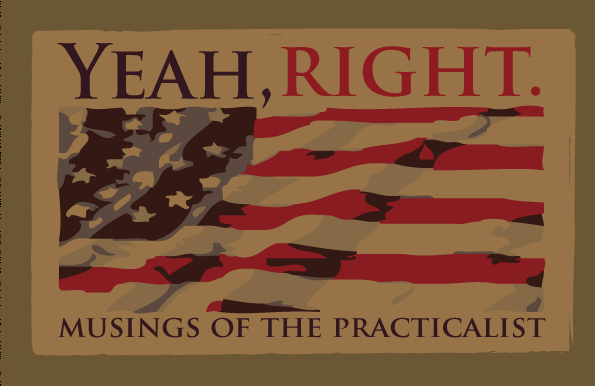No Religion
Is there really such a thing as no religion? John Lennon seemed to think it would be a wonderful world. What exactly did he envision? People wandering aimlessly with no set of values or principles upon which to live their lives?
But wait, says the philosopher, religion is defined as a belief in a higher power, or the mystical, or in phenomena. Says who?! I find it interesting that religion is being defined by those who disagree with people who claim to be religious. Religious people don't define religion. If one were to analyze all these arguments about religion and government, separation of church and state, etc., one would find some very interesting definitions of religion. Most are defined by secularists and humanists, and other philosphers, who are trying to remove themselves, and everyone else, from "religion." They are using the same arguments that have been used for millenia by anyone trying to extinguish others. To fight your opposition, you have to define them.
The problem is, religion is basically a system or set of beliefs upon which one bases his actions and attitudes. If one believes in God, or a god, or multiple gods, or undefined gods, one conforms his actions to the dictates of conscience which arise out of that belief. One who thinks there might be a god, but doesn't care (agnostic), lives his life on that assumption. One who believes in God, and recognizes God's compassion as what drives God, will conform his actions to that assumption that God is a compassionate God; while one who recognizes God's judgment as being most important will conform his life to that assumption. Likewise, one who believes there is no God, or gods, or supreme being, or whatever, will base his life on that assumption. Perhaps he will think that man is supreme, or he will think that mankind is no more than a fortunate animal. It doesn't matter, for he will conform his actions to whatever his assumption about life might be. He then has a religion. One cannot shake religion, just as one cannot shake the need for oxygen or food. Religion happens. It is there, and not going away just because one does want to be classified as religious.
Why do I bring this up? Well, the first Amendment to our Constitution establishes that Congress shall make no law respecting the establishment of religion, or prohibiting the free exercise thereof. The great downfall of our society has been the assumption that this meant that anything smacking of organized religion does not belong in our government. But where does it mention organized religion? It does not. If one is convinced that his moral dictates require him to seek office, or to vote in a certain way, or to impose a certain value upon society, then for a court to prevent him from doing so solely because his viewpoint is considered to align with an established religion is a violation of the First Amendment. For in so doing, the court is "establishing" the "religion" of the opposite view.
While I have been pondering upon this concept for some time, I must admit that it is a difficult one to explain. Perhaps in my mind, it is becoming more clear, while my explanation of it is faulty. If anyone reading this can see where this concept might be going, feel free to comment. I'll continue working on it.








1 comment:
Good points and I agree with you for the most part. But I disagree with you on a couple of things...
First, and kind of off topic, I don't believe that people necessarily conform their behavior to their religious beliefs. I think most people are "knowing sinners", for lack of a better description. For example, I believe that certiain things are wrong but I do them everyday and I have no real intention of changing. There is an obvious disconnect between my beliefs and my actions that I push to the back of my mind. I think loads of people are like this. Of course, I do believe in Salvation so maybe my point is moot.
Secondly, the founding fathers barred religion because of all the trouble that the Church had caused over the years. It does not mention organized religion but it is apparent, at least to me, that that's what they meant. The DOI mentions God and natural law and it's historical fact that few, if any, of the guys at the Constitutional convention were atheists or held anti-religious vews. I think what they were trying to do, and what the courts are doing today, was/is to prevent any kind of religion from getting even a toe-hold in the "official" decision making process. Obviously they expected a person to vote their beliefs, religious or otherwise.
I'm confused about the part of your post where you state that the courts are preventing people from voting in a particular way, or running for office, or imposing a value on society because of their religious beliefs. Where is this happening? No, the principal of a school cannot lead the students in the Lord's Prayer, but who wants or even needs that? Is this what you're talking about?
Anyway, keep up the good work and GO HOGS!
Post a Comment